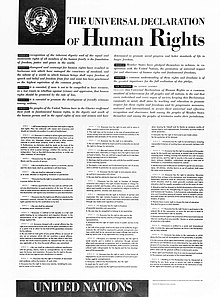
Back Universele Verklaring van Menseregte Afrikaans Allgemeine Erklärung der Menschenrechte ALS «የሰብዓዊ መብት አቀፋዊ መግለጽ» Amharic Declaración Universal d'os Dreitos Humans AN الإعلان العالمي لحقوق الإنسان Arabic الاعلان العالمى لحقوق الانسان ARZ Declaración Universal de los Derechos Humanos AST Akpach jaqe walinkañapataki inoqat aru Aymara İnsan Hüquqları Haqqında Ümumi Bəyannamə Azerbaijani دونیالیق اینسان حاقلاری بیلدیریسی AZB
| Universal Declaration of Human Rights | |
|---|---|
 Eleanor Roosevelt holding the English language version of the Universal Declaration of Human Rights in November 1949 | |
 The human rights adopted by the United Nations General Assembly of its 183rd meeting, held in Paris on 10 December 1948 | |
| Created | 1948 |
| Ratified | 10 December 1948 |
| Location | Palais de Chaillot, Paris |
| Author(s) | Draft Committee[a] |
| Purpose | Human rights |
| Official website | |
| un.org/udhr | |
| Full text | |
| Rights |
|---|
 |
| Theoretical distinctions |
| Human rights |
| Rights by beneficiary |
| Other groups of rights |
The Universal Declaration of Human Rights (UDHR) is an international document adopted by the United Nations General Assembly that enshrines the rights and freedoms of all human beings. Drafted by a UN committee chaired by Eleanor Roosevelt, it was accepted by the General Assembly as Resolution 217 during its third session on 10 December 1948 at the Palais de Chaillot in Paris, France.[1] Of the 58 members of the United Nations at the time, 48 voted in favour, none against, eight abstained, and two did not vote.[2]
A foundational text in the history of human and civil rights, the Declaration consists of 30 articles detailing an individual's "basic rights and fundamental freedoms" and affirming their universal character as inherent, inalienable, and applicable to all human beings.[1] Adopted as a "common standard of achievement for all peoples and all nations", the UDHR commits nations to recognize all humans as being "born free and equal in dignity and rights" regardless of "nationality, place of residence, sex, national or ethnic origin, colour, religion, language, or any other status".[3]
The Declaration is considered a milestone document for its universalist language, which makes no reference to a particular culture, political system, or religion.[4][5] It directly inspired the development of international human rights law, and was the first step in the formulation of the International Bill of Human Rights, which was completed in 1966 and came into force in 1976. Although not legally binding, the contents of the UDHR have been elaborated and incorporated into subsequent international treaties, regional human rights instruments, and national constitutions and legal codes.[6][7][8]
All 193 member states of the United Nations have ratified at least one of the nine binding treaties influenced by the Declaration, with the vast majority ratifying four or more.[1] While there is a wide consensus that the declaration itself is non-binding and not part of customary international law, there is also a consensus that many of its provisions are binding and have passed into customary social law,[9][10] although courts in some nations have been more restrictive on its legal effect.[11][12] Nevertheless, the UDHR has influenced legal, political, and social developments on both the global and national levels, with its significance partly evidenced by its 530 translations.[13]
Cite error: There are <ref group=lower-alpha> tags or {{efn}} templates on this page, but the references will not show without a {{reflist|group=lower-alpha}} template or {{notelist}} template (see the help page).
- ^ a b c "Human Rights Law". United Nations. Archived from the original on 13 August 2020. Retrieved 20 August 2020.
- ^ "A/RES/217(III)". UNBISNET. Archived from the original on 21 January 2019. Retrieved 24 May 2015.
- ^ UDHR Booklet, Art. 2.
- ^ "Universal Declaration of Human Rights". Amnesty International. Retrieved 20 August 2020.
- ^ "Human Rights: The Universal Declaration vs The Cairo Declaration". Middle East Centre. 10 December 2012. Retrieved 20 August 2020.
- ^ "Protection of Human Rights under Universal International Law". United Nations. Retrieved 25 June 2021.
- ^ "Declaration on Human Rights Defenders". www.ohchr.org. Retrieved 25 June 2021.
- ^ "70 Years of Impact: Insights on the Universal Declaration of Human Rights". www.unfoundation.org. 5 December 2018. Retrieved 25 June 2021.
- ^ Henry J Steiner and Philip Alston, International Human Rights in Context: Law, Politics, Morals, (2nd ed), Oxford University Press, Oxford, 2000.
- ^ Hurst Hannum, The universal declaration of human rights in National and International Law, p. 145
- ^ Posner, Eric (4 December 2014). "The case against human rights". The Guardian. ISSN 0261-3077. Retrieved 22 January 2020.
- ^ Sosa v. Alvarez-Machain, 542 U.S. 692, 734 (2004).
- ^ "OHCHR | Universal Declaration of Human Rights Main". www.ohchr.org.